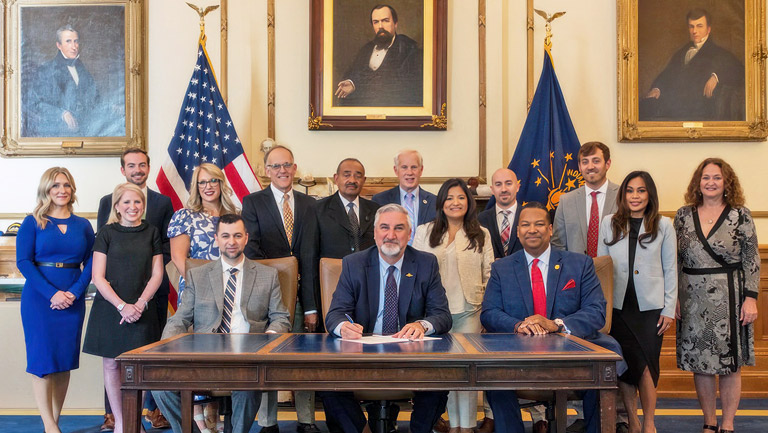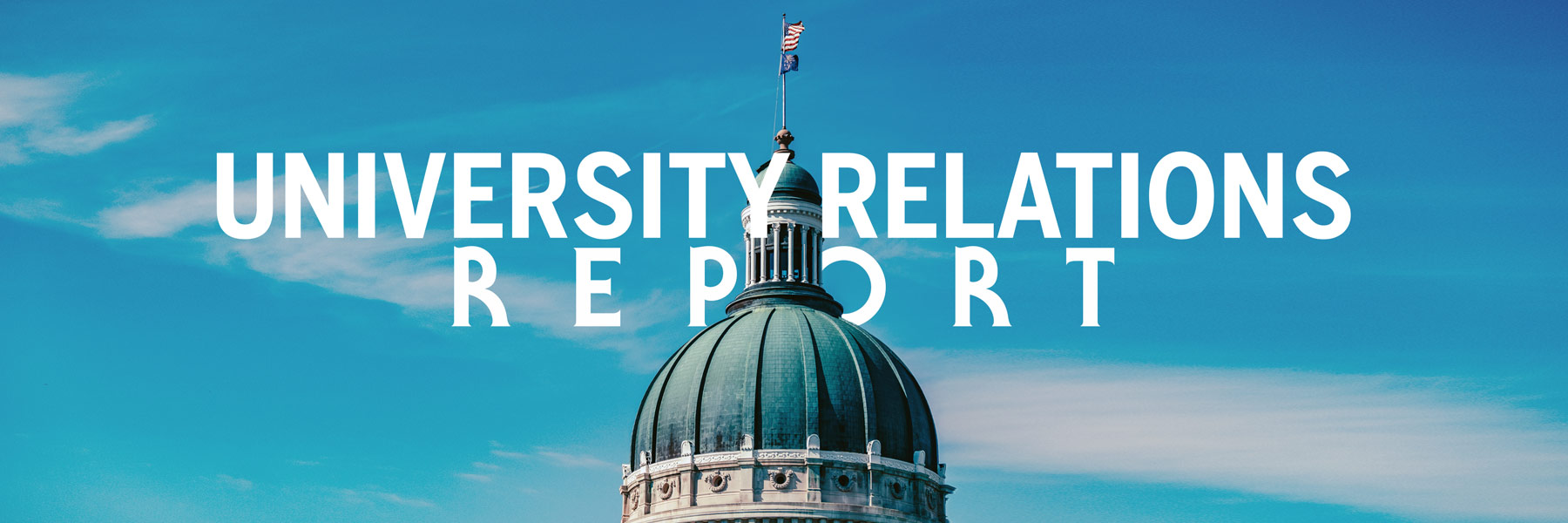21st Century Scholars auto-enrollment becomes law
Following up from our lead story on Feb. 24th, the bill to allow the Indiana Commission for Higher Education to automatically enroll all eligible students into Indiana’s 21st Century Scholars program—and instead provide an opt-out provision for families who do not want to participate—was signed into law by Indiana Gov. Eric Holcomb on May 4. The Governor held a ceremonial bill signing this past Monday with bill author Rep. Earl Harris Jr., D-East Chicago, House co-authors and Senate sponsors, along with Indiana Commissioner for Higher Education Chris Lowery, Indiana Secretary of Education Katie Jenner and other supporters.
House Enrolled Act 1449-2023 allows ICHE to put more outreach efforts into helping students complete the Scholars Success Program activities during high school, rather than focusing on enrolling eligible students in the 7th and 8th grade. During testimony given to the Senate Education and Career Development committee, Indiana University testified on behalf of itself, and the state’s other six educational institutions, affirming support for the bill and our collective efforts to help 21st Century Scholars persist year to year and complete a program of study on-time with a degree or credential.

The bill passed the Senate Education and Career Development committee with full support 13-0 and received additional bipartisan support from the Senate Appropriations committee, passing 8-0. Once on the Senate floor, the chamber offered the bill high praise and full bipartisan support with a vote of 48-0. The House concurred 89-1 to minor Senate amendments made to the bill. The law will take effect on July 1.
The commission will then automatically enroll all income-eligible students in the cohort class of 2027 who did not sign up during the current enrollment period. The commission estimates it will enroll over 20,000 more students each year as a result of this legislative change. This fall—and each subsequent fall moving forward—it will notify families of their eligibility and allow parents/guardians to opt their student out of the program at that time.
Julie Payne-Kirchmeier, IU’s inaugural vice president for student success, coordinates IU’s comprehensive student success strategy and serves as a source of support and resources for campus-based student success efforts, including the 21st Century Scholars program.
“By removing the enrollment barrier to the 21st Century Scholar program, we help not only Hoosiers and their families, but our state as well,” Payne-Kirchmeier said. “We know that access to education changes lives, and this expansion of access to higher education for thousands of Indiana students will have positive, lasting impacts on their lives and on our community. IU is grateful to our state legislators, the commission and Governor Holcomb for their collective support of this transformational program.”
IU campuses currently serve roughly one-third of all 21st Century Scholars enrolled in college statewide. In the fall of 2027, IU anticipates nearly doubling the number of 21st Century Scholars enrolled at its campuses due to this new law.
Economic Engagement Update
Helping diverse-led Indiana companies compete and grow
During the first half of last year, $140 billion was spent on venture funding to support new and emerging entrepreneurial firms across the United States. Of that total amount, just 1.2 percent went to Black-, Hispanic-, Asian- and Native American-founded companies.
Red-lining—a form of racial discrimination based on where people live and work—also remains another hurdle for many diverse-led firms.
Enter Enterprise Corps, a collaboration between the Indiana University Kelley School of Business and other partners to work with historically underserved and small businesses to overcome the challenge.
Established during the pandemic, it is poised for expansion and today is helping diverse-led businesses better pursue venture funding and thrive. Kelley has joined forces with the Indy Chamber, Indy Black Chamber and Mid-States Minority Supplier Development Council through the Enterprise Corps to make an impact.
“We’re building an infrastructure so that the Kelley School can help minority-owned business grow,” said Phil Powell, who initially led the effort in central Indiana as Kelley’s associate dean of academic programs in Indianapolis and is now taking it statewide as academic director of the Indiana Business Research Center.
“We are showcasing how the Kelley School of Business and Indiana University can serve the state as engines for economic development,” Powell said. “Central to those efforts is building an ecosystem that helps minority-owned businesses.”
Read the full story
Capturing the economic value of tax-delinquent parcels to foster economic redevelopment
Through a project that began in 2021, students and faculty affiliated with IU Northwest’s Center for Urban and Regional Excellence (CURE), working in partnership with the Lake County Board of Commissioners, have identified more than 7,000 tax-delinquent properties in Lake County. These “churner” parcels represent a major drag on the local economy, as they fail to generate any tax revenue and also sit idle, preventing redevelopment opportunities.
CURE’s efforts led to the passing and signing into law in Indiana of Senate Bill 157, which will go into effect on July 1. The new legislation establishes a process for Lake County, and other similarly situated Indiana counties, to transfer ownership of a tax-delinquent property that twice did not sell at both the county treasurer’s and county commissioners’ tax sale to either the county or a municipality on an expedited basis for future development purposes. It also prohibits those who own property offered for sale at both the commissioners’ and treasurer’s tax sales on two or more occasions from bidding or purchasing other parcels for sale.
“Not only did we do the data work, we had to get the buy-in,” said IU Northwest graduate student Victoria Travis. “You explain that we’re getting these properties that are already tax-assessed in your community and it’s taking away from your budget money. It’s dead land, it’s already not generating any revenue. This is what it does for you, it helps with economic redevelopment.”
Read the full story
Read a previous story about CURE’s work to address the churner issue
A chat about OpenAI
In the May-June issue of INcontext, a publication of the Indiana Business Research Center at IU’s Kelley School of Business, Alex Corn and Mike Petro, regional analysts at the Indiana Department of Workforce Development, take a deep dive into the potential impact of artificial intelligence chatbots such as ChatGPT on manufacturing production, workforce development and labor market research.
A key excerpt:
“Employers need to take an in-depth look at the capabilities AI possesses in terms of innovation. Per Hoosiers by the Numbers, there were more than 85,000 fast food and counter workers in Indiana in 2021. AI should be able to take orders, use robotics to make burgers and then serve the food with another robotic arm through the drive-thru window or over the counter. To put that into perspective, in December of 2020, there were more than 160,000 people unemployed in Indiana. AI could do half that damage by replacing fast food and counter workers alone.
“In 2021, there were more than 351,000 production occupations. What would have happened if manufacturers replaced humans with AI? COVID-19 pushed unemployment as far as any recession, but did so in weeks rather than months. AI would push unemployment well beyond that, but is that a bad thing? It could provide unemployed workers the opportunity to reskill or upskill in this machine-learning future. The end goal should be for AI and humanity to work alongside each other.”
Read the full article
Paying it forward: A flexible pathway to future giving in support of Indiana’s entrepreneurial ecosystem
Indiana University-affiliated entrepreneurs and investors will no longer have to wait for their new business ventures to exit to start planning how to pay it forward.
IU Ventures, IU’s early-stage venture and angel investment arm, recently unveiled a new initiative, in collaboration with the IU Foundation and IU Alumni Association, that will enable IU’s expanding community of venture founders, equity holders and investors to leverage a portion of their future success in support of the university’s efforts to build a thriving entrepreneurial ecosystem in Indiana and beyond.
The IU Founders and Funders Pledge gives entrepreneurs and investors the opportunity to provide a nonbinding philanthropic commitment of any size to IU—to be fulfilled as future success is attained.
Read the full story
IU in the news
Over $10M in grants will address need for more mental health services in Indiana schools
Indiana University has received more than $10 million in grants from the U.S. Department of Education to increase access to mental health services in school districts across Indiana. The grants are part of the Bipartisan Safer Communities Act, which aims to tackle the mental health crisis in schools.
Read the full story
Read IU President Whitten’s blog
2024 solar eclipse initiative to support arts, cultural activities in rural Indiana
A new initiative launched by the Indiana University Center for Rural Engagement will help rural Indiana communities host arts and cultural events and activities related to the 2024 solar eclipse.
Read the full story
Female physicians lead the field in motorsports medicine
In the history of the Indianapolis 500—since 1911—there have been just nine female drivers; there has never been a female medical director for INDYCAR and the Indianapolis Motor Speedway (IMS)—until now. Julia Vaizer, MD, assistant professor of clinical emergency medicine at Indiana University School of Medicine, will be leading emergency medical services on race day for drivers, pit crews, IMS staff and fans.
Read the full story



